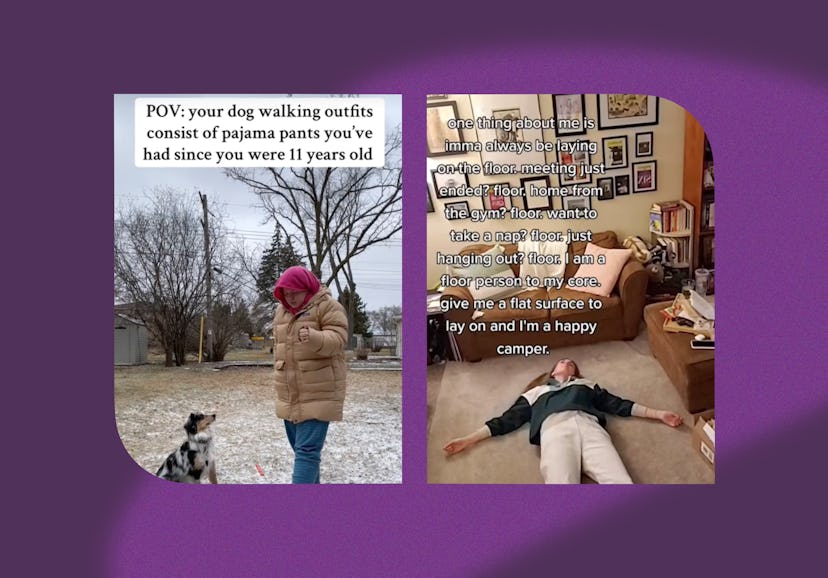Extremely Online
TikTok Is Gross. I Love It.
It makes me feel less ashamed of my unsavory habits.

Social media is notorious for showing everyone’s absolute best side. The typical feed, curated to a T, reveals pristine apartments, to-die-for capsule wardrobes, and enviable daily routines. Scroll long enough and you might become convinced that everyone on the planet has their sh*t together — except for you.
This is why I fell in love with TikTok. In the early days my algorithm showed me the shiny side of social media — and it’s one side I still like to admire on occasion — but it wasn’t long before the algorithm caught on to the real me: A girl in very old sweatpants who often forgets to wash her hair.
Before long my entire feed was filled with videos of bed rotters (me), girls who walk their dog in pajamas and no bra (me), and people who prefer to stay in on a Friday night (also me). Suddenly, I felt at home. My less-than-ideal lifestyle wasn’t niche or embarrassing but 100% normal according to the app. With these videos on my FYP, it even seemed kind of cool to be lazy, imperfect, and maybe even a little bit gross.
While this level of honesty would make other social media platforms clutch their pearls, it’s more than OK — and even encouraged — to “go there” and get real on TikTok. Look in the comments and you’ll often see someone joke, “Y’all are getting way too comfortable on this app,” but that’s what makes it feel like a giant, close community — one where we can all be gross together.
Letting Your Guard Down
It isn’t just me who appreciates this vibe. Psychologist Caitlin Slavens, MC, who posts regularly on social media, says it’s almost like everyone on TikTok collectively said “Let’s stop pretending,” and that’s why there are so many viral videos that offer a glimpse inside the real and decidedly more honest side of life.
“It is gratifying to see people abandon the polished facades and be human, whether that’s by owning up to not washing their hair all week or showing their real and raw emotions about losing their job,” she tells Bustle. “It normalizes not being perfect, and it gives us a space to live authentically rather than hide.”
If it weren’t for this app I would still think I’m the only person who dabbles in these odd behaviors, but it turns out there are thousands — and maybe even millions — of others just like me. Why yes, I do eat the most random girl dinners, just like my parasocial besties on the app. And yes, I will continue to wear my pajamas under my clothes as I run errands — along with 1.2 million other people.
It feels good to know you’re not alone with your quirks and slightly unsavory habits, but Slavens says honest videos like these can also make you feel more confident. Seeing people owning their habits can encourage you to feel less ashamed, she says, and it also reminds you that it’s normal for life to get a little messy.
So many trends have been born from this posting style, too. Alongside the bed rot craze, creators have admitted to crying in their cars, lying on their floors to de-stress, and sleeping in weird positions. Nothing’s off-limits, and it’s so refreshing.
“When people say, ‘I thought I was the only one who did that!’ they’re not only bonding over a shared experience; they’re creating a sense of belonging,” she says. “Being seen and understood is one of the most basic human needs, and TikTok turns that on its head — people connect on their ability to match shared weirdness in real-time in a way that feels true and true to you.”
Bonding In The Comments
Once the algorithm figures out who you are at your core, that’s when the fun really starts. If you want, you can start bonding in the comments with other like-minded people who always seem ready to get even more honest. If you’ve had a similar experience on the app, then you likely know how refreshing it is.
“It creates this tribe feeling where you say, ‘These are my people.’ That’s significant for mental health — and it creates connection and makes you feel less alone,” says Slavens. “When people abandon the pretense and talk as if speaking to a friend, it creates a rare intimacy not found on other platforms. It also creates a ripple effect — when one person opens up, others feel safe to do the same.”
Source:
Caitlin Slavens, MC, psychologist